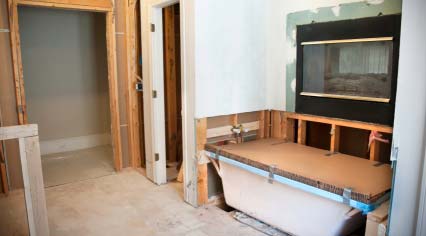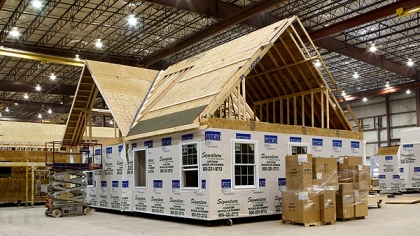Construction Loan Center
How to Choose a Good Contractor

How to Choose a Good Contractor
Choosing the right contractor to either build or remodel your home can make the difference between a relatively stress-free project and countless sleepless nights. Here are some simple steps you can do to ensure that your contractor has what it takes to get the job done.
Why Choosing a Good Contractor is Important
While you may think that finding a good contractor is just common sense, you should be aware of the real risks that come with choosing poorly.
On one hand, there are many horror stories of homeowners who were conned into paying for renovations that either never happened or were completely botched due to gross negligence. In fact, over the past few years, consumer complaints against home construction and renovation contractors has been on the rise. So, even if a contractor seems sincere and is offering you a “great deal,” if you can't verify references or you are being asked to pay upfront without first taking care of the legal formalities, then watch out.
Aside from this, if you are in the market for construction loans or construction to permanent loans, then realize you won't get financing unless your contractor fulfills certain requirements, such as having a license and proving insurance coverage.
6 Steps to Find the Right Contractor for Your Home Building or Renovation Project
Follow these six steps to make sure your contractor is the right one for your project:
1. Ask for recommendations. Don't just reach for the phone book or do an online search for contractors in your area. Aside from asking your neighbors, friends, and family for a list of recommended contractors, you can also get a little creative. Talk to real estate agents, local suppliers of building materials, and any local architects or designers you may know to see who they recommend.
2. Narrow down the list. Once you have compiled a general list, you now need to narrow down your options. You can do this by either calling or sending a quick email out to each prospective contractor. In this initial communication, you want briefly describe what you are looking for and then ask a few short questions to see if the prospect is even worth pursuing Some of the questions you may want to ask include:
- Do they take on projects such as yours?
- How many years experience do they have with such projects?
- Will they offer a list of previous customers who can be contacted for a reference?
- Who are their subcontractors, and how long have they been working with them?
- How many projects do they take on at once?
You should also consult the Consumer Protection Agency as well as the local Better Business Bureau to see if any of these contractors have negative reports filed against them from clients or subcontractors.
3. Conduct an interview with the contractor. Once you've done the preliminary research and received the answers to your questions, pick three to five of the most promising contractors to meet for further discussion and to get an initial time and cost estimate.
One thing, in particular, to pay attention to is how the contractor communicates. Construction and renovation can be a complicated process and is filled with words and concepts that you may not be familiar with. How far does this contractor go to make sure you are both on the same page? How comfortable do you feel with this person? Does the contractor seem to understand your needs, concerns, and vision?
4. Check the list of references. Don't just rely on an online search for customer reviews. Call up former clients to find how their project went and try to see the finished project. If possible, visit a current job site so you can get a real sense of how the contractor works.
If you speak to referrals in person, you have the added benefit of being able to get your specific questions about a contractor answered. You can also learn a lot by the tone of their answers.
5. Compare contractor bids. Get a cost and time breakdown from each prospective contractor so you can compare them. Make sure each bid includes the following items: the cost of materials and equipment, labor costs, and other related expenses. You should also see their anticipated profit margin as well as the payment schedule. Not only is this information important to you, but lenders offering construction loans will need it in order to determine whether or not to approve financing.
Keep in mind, as hinted to above, if the price and time estimate seems too good to be true, then it probably is. So, don't just jump for the lowest bid or the quickest schedule.
6. Get the documentation in order. Finally, your contractor needs to prepare a contract that clearly details every aspect of the project including (but not limited to): the payment schedule; proof of liability insurance and worker's compensation payments; a start date and an estimated completion date; the specific products, materials, and equipment that will be used; and all necessary lien releases.
If you require financing, then be aware that your construction lender will require a license, insurance, resume, and references, as well as a line item cost breakdown from the contractor. So, make sure you get all of this information beforehand.
By carefully following the six steps mentioned above, you will have the information you need to pick the best contractor for your project.






